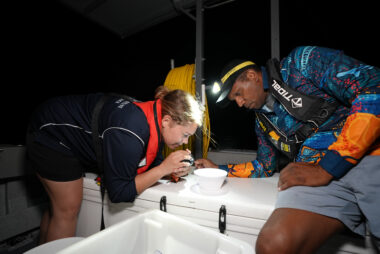An international research group led by the Centenary Institute has developed a new genetic risk prediction tool to identify heavy drinkers most at risk of developing alcohol-associated cirrhosis, a severe form of liver disease.
Reported in the journal Hepatology Communications, the tool offers new hope for the early detection and prevention of alcohol-associated cirrhosis, a condition responsible for over 300,000 global deaths annually.
While excessive alcohol consumption is known to cause liver damage, not all heavy drinkers develop cirrhosis, which is characterised by scarring of the liver. The newly developed tool, known as a polygenic risk score (PRS), helps pinpoint individuals most likely to suffer from alcohol-associated cirrhosis based on their genetic makeup.
In developing the PRS, the researchers compared the genetic profiles of thousands of patients with alcohol-associated cirrhosis to those of heavy drinkers without liver damage. Analysing millions of genetic variations, a risk score was derived from 20 specific genetic markers.
Clinical Professor Devanshi Seth, the senior author of the study and researcher at both the Centenary Institute’s Centre for Healthy Ageing and Drug Health Services, Sydney Local Health District, said the PRS was extremely effective.
"Our polygenic risk score is a powerful new approach to predicting alcohol-associated cirrhosis through an individual’s genes. It allows us to identify individuals at high risk, enabling earlier intervention and preventive measures to help stop liver disease before it progresses,” said Clinical Professor Seth.
The study also revealed that the PRS significantly improves the prediction of alcohol-associated cirrhosis when combined with other traditional (non-genetic) risk factors such as drinking habits, age, body mass index (BMI) and diabetes status. Further, the tool has been found to be useful in predicting the risk of other liver diseases related to metabolic (non-alcoholic) factors.
"Our tool not only predicts the risk of alcohol-associated cirrhosis but has also demonstrated its utility in identifying risks for other liver diseases such as fatty liver disease, suggesting that shared genetic factors are involved,” said Clinical Professor Seth.
“Moreover, individuals who learn that they are at higher risk through this tool may be motivated to adopt healthier lifestyles to help prevent the progression of disease,” she added.
“This tool can aid in the early detection and prevention of multiple liver conditions, offering a far more comprehensive approach to liver health."
The research was undertaken by the multi-national GenomALC Consortium led by Clinical Professor Seth and funded by the National Institute on Alcohol Abuse and Alcoholism (NIAAA) a part of the National Institutes of Health (NIH), USA.
[ENDS]
Publication:
A polygenic risk score for alcohol-associated cirrhosis among heavy drinkers with European ancestry.
Key Facts:
Publication:
A polygenic risk score for alcohol-associated cirrhosis among heavy drinkers with European ancestry.
About us:
About the Centenary Institute
The Centenary Institute is a world-leading independent medical research institute, closely affiliated to the University of Sydney and the Royal Prince Alfred Hospital. Our research spans the critical areas of cancer, cardiovascular disease, rare diseases, inflammation, infectious diseases, healthy ageing and biomedical AI. Our strength lies in uncovering disease mechanisms and applying this knowledge to improve diagnostics and treatments for patients.
For more information about the Centenary Institute, visit centenary.org.au
Contact details:
For all media and interview enquiries, please contact
Tony Crawshaw, Media and Communications Manager, Centenary Institute on 0402 770 403 or email: [email protected]


